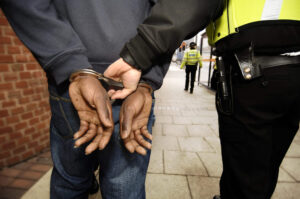But the problem runs deeper than marijuana arrests, says one mom. It’s about arrests in general.
By Johannes Werner
Original Air Date: Dec. 20, 2023
Host: There is broad support to reduce the prison population incarcerated on minor drug offenses, namely for possession of marijuana. So four years ago, to take steps in that direction, the City of Sarasota created what is called a pre-trial diversion program that allows offenders to avoid prison and a criminal record. But the devil is in the detail, and dysfunction in the program has prompted city commissioners to take steps towards ending it. But that, in turn, is now producing pushback. Our news team reports.
Johannes Werner: In 2019, the City of Sarasota developed its cannabis civil citation program, at the urging of a local coalition of churches called Sarasota United for Responsibility and Equity, or SURE for short. It provides an option of a $100 citation or 10 hours of community service instead of arrest for individuals charged with misdemeanor for cannabis or paraphernalia possession. The general idea was to help offenders avoid criminal records and prison.
But in November, the Sarasota City commission voted 4-1 – with Commissioner Erik Arroyo dissenting – to take steps to end the Sarasota Police Department-run program. Instead, officers would send marijuana offenders to a state attorney’s program called APAD that was set up more recently.
The move came after a police advisory panel recommended to end the city’s program, due to low buy-in by offenders and the lack of teeth to punish non-compliance.
According to that panel’s findings, only 11.25% of the 427 offenders in the city program paid the fine or did anything else they were told to do.

Lachman
On last week’s Peace and Justice Report on WSLR, Vicki Lachman, a retired nurse who chairs the city police advisory board, explained.
Vicki Lachman: After nine meetings and workshops where we examined this issue over and over again, we were increasingly concerned about the fact that there was no compliance. We discussed this, and we decided in the first year that we solve the problem. But we decided to collect more data from a number of other cities. And what we saw was the lack of consequences in our ordinance, and where the other cities had consequences, if in fact people didn’t do community service. So we discussed what we could begin to recommend about that. And we finally came up with a recommendation that we decided to put forth to the city commission, and that was back in April. And so the basic change in what we were recommending to the city commission was that there would be an assurance that the civil citation supposedly is listed in the ordinance and that might be for the utilization of a collection agency or considering additional fees, and that there would be police discretion. I made that recommendation to the commission in May, and what they have decided to do, and it makes a lot of sense, is to go with the adult pre-arrest diversion program, which does put the consequences in that we were requesting, and it also expands the program. It’s utilizing all the candidate counties, it would be Sarasota, Manatee and DeSoto, and it would be operated from the state, rather than taking up Sarasota police time to deal with this issue.

Bergbreiter
JW: The city commission’s move has prompted a strong reaction by a community activist. Deanie Bergbreiter also happens to be the mother of an adult son who went through a harrowing experience with city police recently. She argues the city should try to improve the program and adapt it to the reality of people’s lives, rather than end it.
Deanie Bergbreiter: Can they tweak the citation ordinance, to make it fit better for what I believe the intent of the citation ordinance is? Absolutely! But to eliminate it and just go with a pre-trial diversion, which is what the police have recommended, that’s a mistake. The point of that citation legislation was to prevent people of color and marginalized people from having continued contact with the police. Those diversion programs put a whole lot more restrictions and requirements.
JW: In an email to Peace and Justice Report host Tom Walker, Sarasota Police Chief Rex Troche responded to Bergbreiter’s criticism, suggesting she may be talking about a different state attorney program called Pre-Trial Intervention. APAD is different, Troche argues.
“If all the elements are met, in this case possession of marijuana and less than two times in the APAD program, then the person is given a citation (no arrest). Further, officers have discretion and even if the subject has been in APAD twice, an officer may simply confiscate the marijuana for destruction with no attached charges or enter the marijuana as evidence and give the person a misdemeanor citation with a court date.”
To be sure, the end of the city program is not a done deal. On Feb. 5, the city commission is scheduled to discuss the issue in its regular meeting, and the public will have a chance to weigh in.
VL: The city ommission would be having a meeting on February fifth, where we have to do public meetings here. So that would be the first one, on February 5. So there hasn’t been … what people need to understand is that there hasn’t been any movement forward. So this is what we’re recommending to the city commission for the adult pre-arrest diversion program. But there are some other things that need to take place before this gets implemented.
JW: Of course, the entire discussion could be moot – or at least change substantially – if Florida voters adopt an amendment in Florida’s constitution that legalizes certain uses of marijuana. So stay tuned for the outcome of the November 2024 elections.
 All that said, community activist Bergbreiter argues the problem is bigger than just marijuana possession. Her main concern is about the way police officers handle arrests. Hard-to-define offenses such as loitering or prowling are often used in arrests, throwing marginalized people into a labyrinth with no exits.
All that said, community activist Bergbreiter argues the problem is bigger than just marijuana possession. Her main concern is about the way police officers handle arrests. Hard-to-define offenses such as loitering or prowling are often used in arrests, throwing marginalized people into a labyrinth with no exits.
DB: I have an adult child with autism. He was subjected to abuse and harassment and illegal search. They actually manhandled him, wrapped him up. I wouldn’t go so far as to say they beat him. But he certainly came out of the encounter with a cut on his forehead. He was bleeding, had bruises, and he was traumatized, and for nothing. It was a charge of loitering, which is a misdemeanor. And then on top of that they threw on nonviolent arrest, resisting arrest. And, of course when they searched him illegally, they found a little tiny bit of marijuana, which they also charged him with. So it was just a horrible experience. After I looked at the police tapes, it was clear that they had no probable cause to stop him. They certainly had no right to search him, and I almost believe they made fun of him as an adult with a disability, and that was very disturbing to me. So there’s a couple of things: the whole issue of being able to charge somebody with something silly like loitering. And the fact that I don’t think the police are very well trained to handle people who are neuro-divergent or have some kind of disability. The loitering issue, it smacks of … disproportionally affects people of color, people who are marginalized. That’s the crux of the matter, isn’t it? I mean, the officers discretion. And I suppose if the police don’t have a policy in place that corresponds with the views of society and the population, then we’re going to have a problem. That’s an issue that we have to address as a community with the police.
JW: Police chief Troche had this response to Bergbreiter’s concern about arrests for loitering: “An officer has the discretion to make an arrest if deemed appropriate.”
This has been Johannes Werner, reporting for WSLR News.
WSLR News aims to keep the local community informed with our 1/2 hour local news show, quarterly newspaper and social media feeds. The local news broadcast airs on Wednesdays and Fridays at 6pm.